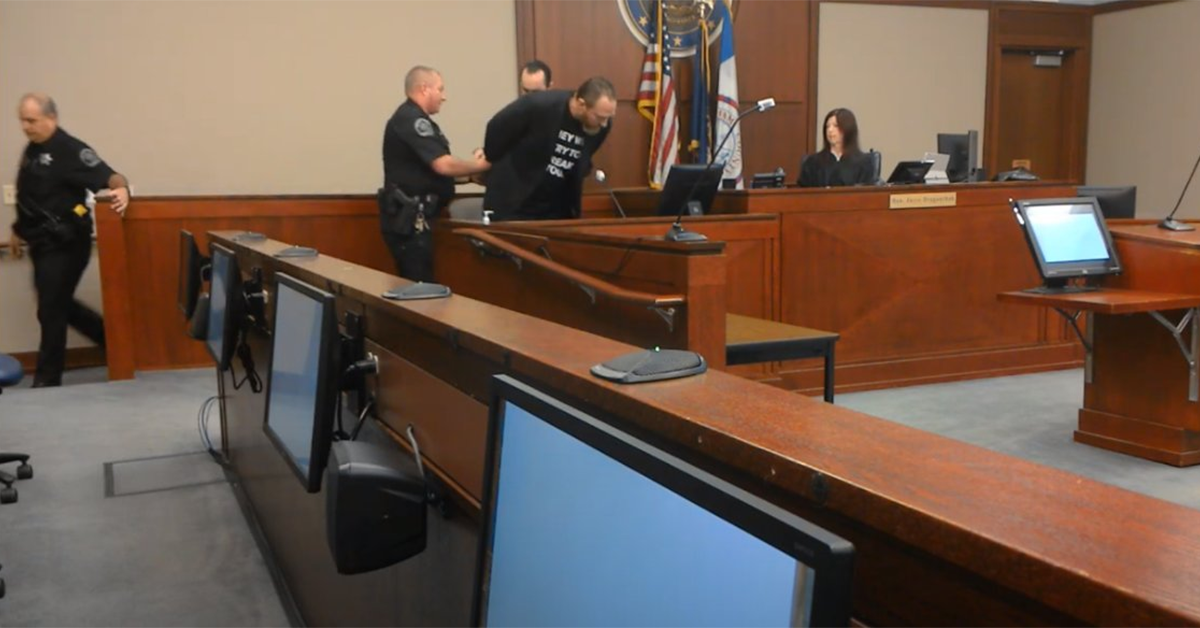Michigan Marijuana Entrepreneur Faces Multiple Felony Charges for Cyberstalking

Michigan's marijuana industry is witnessing a legal storm as Michael Doherty, a prominent cannabis business entrepreneur, is currently held in Ingham County Jail. Doherty was recently arraigned on 10 felony counts related to cyberstalking, targeting Lansing Mayor Andy Schor and several other unidentified individuals.
According to Lansing Assistant Police Chief Robert Backus, the authorities took Doherty into custody last Friday. The charges include aggravated cyberstalking and utilizing a computer for unlawful purposes. Doherty's arraignment saw 54-A District Judge Cynthia Ward setting a bail amount of $125,000. Further conditions for his release comprise wearing a GPS tether, undergoing a psychological evaluation, and strictly avoiding any contact with the victims mentioned in the complaint. While Backus refrained from disclosing all victims' identities, Mayor Schor confirmed he was one of them. Reports indicate that the victims received an overwhelming number of text messages, running into the thousands.
Doherty, owner of marijuana manufacturing firms MD Industries LLC and Rehbel Industries LLC, faced business hurdles as both companies crumbled under a massive $12.5 million debt. As a consequence, they were put under receivership in the previous year.
This isn't Doherty's first brush with the law. Last April, during a court hearing presided over by 30th Circuit Judge Draganchuk, he was handed a 93-day sentence for criminal contempt. This followed an outburst in which he accused the judge of engaging in "corrupt and unacceptable actions." The hearing centered on a motion put forth by attorney John Polderman, the court-appointed receiver. Polderman's motion accused Doherty of multiple misdemeanors, including harassing a title agent managing the transfer of MD Industries property, making veiled threats via email, and sending inappropriate messages to individuals connected to the case.
Post his release from Ingham County Jail, Doherty's controversial actions continued. He resumed emailing earlier contacts, extending his list of recipients. One notable target was Berl Schwartz, the editor and publisher of City Pulse. Disturbing messages from Doherty to Schwartz included an image of the editor with a caption reading, "These idiots will get theirs too." In a subsequent email, Doherty conveyed to Schwartz that his "entire Firm is going down over this... Can't perform Domestic Terrorism and get away with it in the Court of Law."
At the core of Doherty's grievances against City Pulse and Schwartz was the perceived lack of reporting on alleged "corruption" involving Polderman, Draganchuk, and others. It's worth noting that City Pulse had previously covered Doherty in 2020, documenting his purchase of the old John Bean factory and his subsequent establishment of a marijuana manufacturing venture. The media outlet has since published multiple stories on him, including an exclusive video capturing his contempt court hearing:
Doherty's legal journey continues, with his next court appearance slated for November 2nd before Judge Ward, as informed by Backus.
Michigan-Based Cannabis Group Under Scrutiny for Questionable Licensing Practices Out-of-State

In the complex realm of social equity programs intended to benefit marginalized communities by providing cannabis business opportunities, a concerning development has surfaced. Participants unknowingly find themselves ensnared in contracts that not only strip them of their rights but also unknowingly expose them to financial risks. While the program promises prosperity for the marginalized, some unscrupulous entities appear to exploit it for their gain. This report delves into this alarming situation, the individuals involved, and the implications for those unwittingly caught in the web.
15-Year-Old Faces Adult Charges in Macomb County Marijuana Robberies

In a recent surge of criminal activities targeting marijuana dispensary drivers, a teenager from Clinton Township has been placed at the center of these events. The youth, aged just 15, is now facing serious charges as an adult for his alleged involvement in these incidents.
Law enforcement authorities have reported that the teenager is believed to be responsible for three distinct robberies of dispensary drivers that took place in Macomb County throughout October. Following a thorough investigation, the young individual was officially charged on Tuesday, October 24th. The charges leveled against him include three counts of armed robbery and an additional two counts related to felony firearm possession.
The gravity of the charges reflects the seriousness with which authorities are approaching such crimes, especially when connected to the rapidly growing marijuana industry in Michigan. This serves as a reminder to businesses and consumers about the importance of safety in this sector.
Given the weight of the accusations, a bond was set at a substantial $300,000. Furthermore, the court has mandated several conditions to ensure public safety and the well-being of the accused. Among these, the teenager has been ordered to undergo a comprehensive mental health evaluation. The court has also explicitly instructed him to avoid any form of contact with the victims of the alleged robberies. If the bond amount is posted and the teenager is released, he will be required to wear a steel-cuff GPS tether, ensuring his movements can be tracked at all times.
The incidents in Macomb County highlight the growing concerns surrounding safety in the marijuana industry. As the sector continues to expand, it underscores the necessity for rigorous safety measures and public awareness.
This news serves as an essential update for all stakeholders in Michigan's cannabis landscape, from consumers and businesses to regulators. Ensuring that the industry operates safely and responsibly remains paramount as Michigan navigates the complexities of its blossoming marijuana market.
Marijuana Gummies at Juvenile Facility Leads to Teacher's Arrest

In a recent development in Michigan's cannabis scene, a Detroit-based teacher is facing serious legal repercussions after being accused of introducing marijuana-infused gummy bears to a juvenile detention center. This incident adds to the ongoing dialogue about marijuana regulations and the complexities surrounding its legality in different contexts.
The teacher in question, Darla Spinner, 48, has been formally charged with possession of marijuana on school property. This announcement was made by the Wayne County Prosecutor's Office. Spinner, who was serving as an educator at the Wayne County Juvenile Detention Facility in Hamtramck, is alleged to have brought the cannabis-infused gummies into the institution on the morning of July 12th, around 8 a.m.
Following this alleged incident, Spinner was charged on July 27th. Fast forward to Thursday, October 20th, she was taken into custody. The authorities have set a $2,000 cash interim bond for her release. The legal proceedings are in motion, with Spinner's arraignment scheduled for the upcoming Thursday morning, October 26th. Presiding over the case will be 31st District Court Judge Alexis Krot.
There are lingering uncertainties concerning the incident. Given the information available, the intentions behind Spinner's alleged act remain unclear. It's yet to be determined whether the gummies were meant for distribution within the facility or if they were for her personal consumption.
The situation underscores the importance of clear regulations surrounding cannabis, especially in places like educational institutions. As Michigan continues to navigate its stance on marijuana, incidents like these are likely to fuel the discourse on its implications and appropriate usage.
Bribery Charges Land Brian Pierce a Two-Year Prison Sentence

In a corruption scandal that has sent ripples through Michigan's political and marijuana industry circles, Brian Pierce, a once-prominent lobbyist, has been sentenced to two years in federal prison for his role in bribing Rick Johnson, the head of the Michigan marijuana licensing board.
The Crime and its Perpetrators
Brian Pierce was found to have facilitated a sum of $42,000 to Rick Johnson. Johnson, who had earlier gained prominence as a powerful Republican lawmaker, led the marijuana board between 2017 to 2019. During his tenure, the board was responsible for reviewing and granting approvals for applications to cultivate and distribute marijuana for medicinal purposes.
Yet, the shadow of corruption was not limited to the exchange between Pierce and Johnson. The latter had also received a total of $110,000 in bribes, leading to his recent sentencing to over four years in incarceration.
Pierce's involvement in the scandal was further highlighted by allegations, later confirmed, of him spending $2,000 on a Detroit stripper as a means to bribe Johnson. This act, alongside other documented cases of corruption, portrays a dark image of the marijuana industry's inception phases in the state.
Furthermore, Vincent Brown, an associate of Pierce, is also set for sentencing, while Oakland County businessman John Dalaly received 28 months in prison for his part in this intricate bribery web.
A Corrupted System
The Assistant U.S. Attorney, Christopher O'Connor, underscored the gravity of Pierce's actions, stating that such bribes "corrupted the process for the state's issuance of licenses for businesses to operate in a new and lucrative industry." The corruption allegations and subsequent trials have tainted the reputation of an industry that was only recently legalized.
Michigan had approved marijuana for medicinal use back in 2008. A decade later, in 2018, voters gave a nod to the recreational use of the herb. However, in a move that many believe was a response to the emerging scandal, Gov. Gretchen Whitmer dissolved the medical marijuana board in 2019, placing the industry's oversight under a state agency's jurisdiction.
Accountability and Repentance
In a recent hearing at Grand Rapids, presided over by U.S. District Judge Jane Beckering, Pierce was highlighted as a symbol of the potential dangers of public corruption. Beckering, addressing Pierce, remarked, "You are a poster child of all the harm that can come from public corruption."
In a somber moment during his allocution, Pierce admitted to his wrongdoings, stating, "I traded in my moral compass for financial gain... Choices were made, and each time, they were the wrong ones."
Pierce's defense attorney, Ben Gonek, had earlier requested a sentence of just over a year, emphasizing his client's cooperation with the law and guilty plea. While Pierce's collaboration was indeed recognized by prosecutors, his actions' severity warranted a sterner penalty.
A History of Scrutiny
Rick Johnson's controversial history dates back to his time as the House speaker from 2001-04. Scrutiny intensified when he was appointed to chair the Medical Marihuana Licensing Board in 2017 by former Gov. Rick Snyder, especially given Johnson's stint as a registered lobbyist between 2005 and 2016.
With the chapter on this corruption scandal slowly closing, Michigan's residents and political circles await further reforms and more stringent oversight, ensuring that such malpractices don't repeat in the future.
Michigan Marijuana Boom: An Opportunity for Legal Eagles

The cannabis landscape in Michigan is rapidly transforming, and the legal community is among the many beneficiaries of this burgeoning sector.
Myles Baker: A Rising Star in Cannabis Law
At the tender age of 31, Myles Baker, an associate attorney at the Detroit-based Dickinson Wright PLLC, stands on the cusp of making partner. This significant milestone usually eludes lawyers until they've had about eight to ten years of experience. However, the legal cannabis boom in Michigan is fast-tracking the careers of many like Baker.
For Baker, the emerging marijuana sector has provided an accelerated route to expertise. He notes, "The rapid evolution of the marijuana industry has allowed me to carve out a niche for myself, keeping pace with attorneys who've been practicing for decades longer." Unlike other areas of law steeped in a century of case law, the cannabis space is still in its infancy, making it a lucrative domain for those willing to navigate its uncharted waters.
The Impact of Legalization
Since Michigan ushered in legal marijuana sales in 2018, lawyers have played an indispensable role in shaping the industry. They have assisted operators in understanding and adapting to frequently evolving regulations, interpreting the intricate interplay between state and federal laws, and ensuring compliance with local municipality guidelines.
Lance Boldrey, a partner at Detroit's Dykema Gossett LLP, highlights the importance of the cannabis sector to the legal profession. "The cannabis industry has significantly contributed to our revenue, making it our fastest-growing practice area. Every domain of our firm has, in some way, represented cannabis."
Cannabis: Michigan's Golden Goose
With sales reaching a staggering $2.3 billion in 2023 alone, Michigan has cemented its position as a dominant player in the marijuana industry. However, it hasn't been smooth sailing for all. While the state witnessed a slump in marijuana prices in recent years, it has rebounded to a healthier figure this September.
The fluctuating market dynamics offer lawyers unique challenges, from securing licenses to assisting businesses in streamlining operations and navigating the intricacies of tax law.
The Legal Labyrinth of Cannabis
For firms like Detroit-based Honigman LLP and The Dragich Law Firm PLLC, the financial struggles of cannabis businesses, such as Skymint's debt issues, present opportunities. Meanwhile, Marshall-based Common Citizen, a significant player in the state, has incurred substantial legal costs since its inception.
But as Boldrey candidly admits, the law industry is not immune to the economic challenges faced by the cannabis sector. He likens the situation to the Dot Com era, where only a handful of startups truly thrived.
Choosing Clients Wisely
Dykema exercises discernment when selecting its cannabis clients. Boldrey emphasizes the importance of thorough due diligence, looking for reputable clients with a solid business background.
Yet, the cannabis sector isn't just about corporate law. Matthew Abel, founder of Cannabis Counsel Law Firm, transitioned from defending marijuana-related misdemeanors and felonies to aiding clients in establishing compliant business models.
Abel recalls the initial skepticism he faced, "Many contemporaries thought I was making a risky move. Today, every major law firm boasts a cannabis practice group."
The Future of Cannabis Law
With the legal framework around cannabis in a constant state of evolution, lawyers, especially the younger ones, find themselves in a unique position. For instance, John Abbo leveraged his expertise in cannabis law to secure a prominent role at Lume Cannabis Co.
Myles Baker eloquently encapsulates the potential of this sector for the legal community, "Cannabis law isn't just about marijuana. It covers every facet of legal practice. We're not just practicing law; we're shaping it for future generations."
In the interplay between marijuana and law, Michigan's legal eagles see not just challenges, but a world of opportunity.


 Helpful Links
Helpful Links